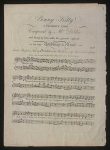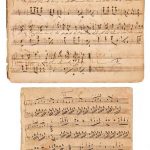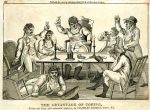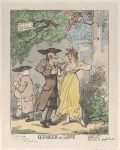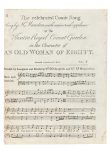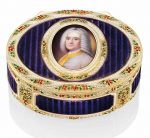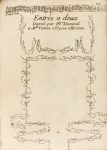Music sheet for Bonny Kitty composed by Mr. Dibdin, published by Preston, London ca. 19th century
Charles DibdinEARLY AMERICAN MUSICAL MANUSCRIPTS. 2 Holograph Musical Manuscripts, the first 46 pp recto and verso, 4to (190 x 235 mm), the second 12 pp recto and verso, 8vo (160 x 195 mm), n.p., c.1790, featuring handwritten music and lyrics to popular tunes of the era, both volumes disbound, pages toned, some chipping at edges.
Likely prepared for home use, perhaps by a student (some of the songs contain fingering notations), the present books contain music an lyrics for several popular late 18th century tunes, including “[Ode] On the Death of Dr. Franklin” (the first stanza only), “Handel’s Water Piece,” “The Match Girl,” “The Soldier’s Adieu by Dibdin,” and “A Favorite Hymn by Dr. Arnold” in the larger volume, and “God Save Great Washington,” “The Beggar Girl,” and “The Maid of Lodi” in the smaller volume, among other titles. “God Save Great Washington,” sung to the tune of “God Save the King,” dates to the end of the Revolutionary War and served as a defacto campaign song for the General.
Sold for US$ 701 (£ 557) inc. premium at Bonhams in 2019
The Advantage of Toping. Written and sung, with unbounded applause, by Charles Dibdin, senior, Esq. DescriptionHeading to printed verses (46 ll.): ‘Written and Sung, with unbounded Applause, by Charles Dibdin, Senior, Esq.’ Seven men drink round a table lit by two candles; some sit, some stand, one lies prostrate, one is asleep. The chairman stands, raising his glass. The refrain begins:’Then all get drunk if you wish to be happy.’ 1 December 1807 Etching with letterpress
Reference: © The Trustees of the British Museum
Quaker in Love,1815 (?) Thomas Rowlandson Text below this print associates the scene with Charles Dibdin’s comic opera “The Quaker.” The lines comes from a song used by the mian character uses to propose marriage. Rowlandson shows the main character outside a house placing his hand on the offered breast of a buxom young woman. Two women watch the scene from an open window above as a short, stocky man walks away at left near a sign lettered “Man traps placed in these grounds.”
p>Reference: The Metropolitan Museum of ArtDibdin, Charles. COLLECTION OF PRINTED SONGS, OVER A DOZEN SIGNED BY THE COMPOSER (“CDIBDIN”), INCLUDING AN APPARENTLY UNIQUE SOURCE FOR THE SONG ‘HOW GOOD AND HOW KIND OF HIS DEAR MAJESTY’ FROM “THE OLD WOMAN OF EIGHTY” The celebrated Comic Song Sung by M.r Munden…at the Theatre Royal Covent Garden in the Character of An Old Woman of Eighty, 2 pages, folio, London: Longman and Broderip, [1782 or later] together with songs from The Cake House, A Frisk, The Masque in Amphytrion, The Padlock, The Chelsea Pensioner, The Oddities, Britons Strike Home, The New Years Gift, The Fortune Hunters, Liberty Hall, The Waterman, The Quaker, The Deserter, Poor Vulcan, Yo Yea, or The Friendly Tars, Pandora, The Saloon, The Wives Revenged, Clump and Cudden, The Islanders, The Seraglio over 80 songs in all, various sizes, engraved music, a few songs laid down, some contemporary manuscript annotations, disbound, second half of the eighteenth century and early nineteenth century, some browning and staining, An Old Woman of Eighty cropped and splitting along folds
Sold for 840 GBP at Sotheby’s in 2005
